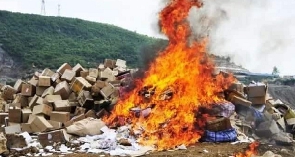Ghana’s former First Lady, Nana Konadu Agyeman-Rawlings, has recalled the initial moments of the overthrow of the country’s first president, Kwame Nkrumah.
Having been a student of Achimota School at the time, Nana Konadu wrote in her book, It Takes A Woman, that among the things that shocked her, was the burning of books and literature.
She explained how, even more puzzling, was the fact that the highest-ranking diplomat from the United States Embassy, was also present at their school to ensure that the exercise of erasing all traces of Kwame Nkrumah, were done.
She also recalled how her Russian teachers were immediately whisked away from the school, during which time the National Liberation Council (NLC) team combed the school to pull down all photos of Nkrumah in the school.
“At the beginning of the coup, the NLC spoke of ‘democracy,’ yet the wave of books burning became symptomatic of just the opposite – a harsh and oppressive regime seeking to censor or silence a critical part of our nation’s history. This was perhaps an inherent flaw in the NLC agenda – their direct attempt to erase Nkrumah’s legacy from Ghana’s history.
“Adding to our anxieties at Achimota, a number of Russian teachers were rounded up and presumably shipped away to their home countries. I remember feeling frightened and uneasy at the time of such drastic change in our country. Suddenly, we were all following orders to burn any books, pictures, literature or artifacts that bore Nkrumah’s name, image or ideology. From one dormitory to the next, we took down Nkrumah’s pictures. If we wanted to keep any, we did so at our own risk.
“What I found most disturbing, however, was the sight of the newly-appointed United States Ambassador on Achimota School grounds to supervise our books burning exercise. Many of the students, even in our naivete about politics and political wrangling, could not fathom the sight of an ambassador from the United States, a country which boasted its love for freedom of speech and one that diligently preserved its own history, helped turn ours into ashes. The imagery was stunning, and we struggled to piece together why anyone from the United States would openly oversee the destruction of our written history, irrespective of the current tide of government,” she wrote.
Nana Konadu Agyeman-Rawlings further described how she felt, from the little she knew, that the people who orchestrated the overthrow of Kwame Nkrumah’s government, were from within his direct circle.
She, for instance, explained that the new American ambassador, was a one-time classmate of Nkrumah, and to have seen him there, overseeing the destruction of things the man had built, was only a testament of the fact that there had been some betrayal.
“From the little I know of the men around Nkrumah, I immediately felt a deep sense of betrayal for him, and imagine he would too. The new ambassador was an African-American who coincidentally had been a former classmate of Nkrumah at Lincoln University. His present at Achimota felt like an unwelcome visitor sitting in on a family quarrel. It unnerved me to see him at our school at such an unstable moment in our country’s history. His supervising the burning of our own literary works and anything even remotely associated, but many of which have no relation to Nkrumah, felt repulsive,” she added.
AE/KPE
General News of Sunday, 19 February 2023
Source: www.ghanaweb.com

















